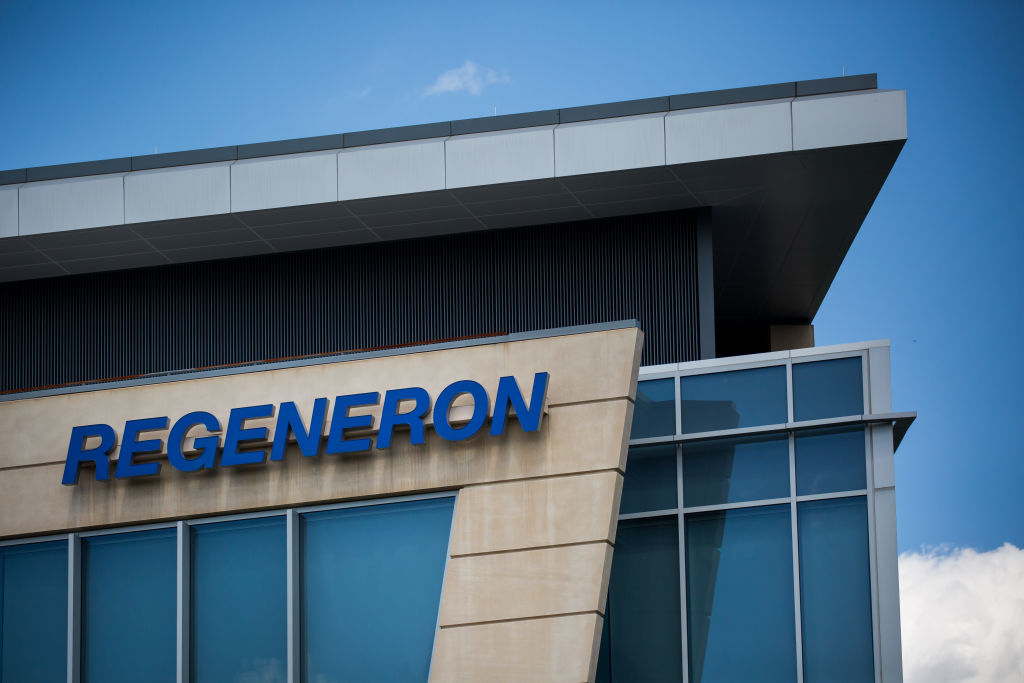
Regeneron Pharmaceuticals is expanding its cancer drug lineup with FDA approval of a bispecific antibody it developed for multiple myeloma, the second most common type of blood cancer.
In multiple myeloma, a cancer of plasma cells, relapse is common. When that happens, patients may need a different drug or combination of drugs than what they received previously, particularly for later lines of treatment. The Wednesday approval of Regeneron drug linvoseltamab covers the treatment of adults whose disease has relapsed or has not responded to at least four earlier lines of therapy. Regeneron will market its new product under the brand name Lynozyfic.
Lynozyfic came from VelocImmune, a proprietary Regeneron technology that generates fully human antibodies for targets of interest. The new Regeneron bispecific antibody is engineered to target BCMA on multiple myeloma cells and CD3 on T cells. Binding to both simultaneously activates the T cell to kill the cancer cell.
Based on results from Phase 1/2 testing, Regeneron had sought FDA approval of Lynozyfic for use after three or four lines of multiple myeloma therapy. The earlier line of treatment is included in the current approval. The FDA said its decision is based on the efficacy population of 80 patients who had received at least four lines of therapy. In these patients, results showed the objective response rate was 70%. At a median 11.3 months of follow up among these responders, the estimated duration of response was 89% at nine months and 72% at 12 months.
Lynozyfic is administered as an intravenous infusion that can be given every two weeks after step-up dosing. If patients show a very good or partial response to treatment, the dosing schedule may be changed to every four weeks. That’s a dosing advantage over other drugs bispecific antibodies for multiple myeloma.
Tecvayli, a BCMA/CD3-targeting drug marketed by Johnson & Johnson, was initially approved for weekly administration drug after step-up dosing. Last year, the FDA approved biweekly dosing, giving patients more flexibility. J&J has another bispecific drug, Talvey, which targets GPRC5D on cancer cells and CD3 on T cells. Talvey is dosed weekly or every two weeks after step-up dosing. Meanwhile, Pfizer’s bispecific antibody for multiple myeloma is Elrexfio, which targets BCMA on cancer cells and CD38 on T cells. Elrexfio is administered every two weeks after step-up dosing.
Dr. Sundar Jagannath, Network Director of the Center of Excellence for Multiple Myeloma at Mount Sinai in New York City and an investigator in Lynozyfic’s clinical trial, said the new Regeneron drug represents meaningful progress for the treatment of multiple myeloma.
“Lynozyfic has a convenient response-adapted dosing regimen, which provides the potential to extend time between doses,” Janannath said in Regeneron’s approval announcement. “This is a significant patient-centric advancement that could help reduce treatment burden.”
Lynozyfic is already available in Europe following its approval there in April. The European Commission decision, which covers patients who have had at least three prior lines of therapy, was a conditional marketing authorization that requires Regeneron to produce additional clinical data to verify patient benefit. Similarly, the FDA decision is an accelerated approval. A Phase 3 test designed to be the confirmatory study is ongoing. While the FDA nod is an accelerated approval, it came later than Regeneron had hoped. Last August, the FDA turned down the submission for Lynozyfic, citing issues at a third-party manufacturer for the drug.
The label for Lynozyfic carries a black box warning for the risk of an excessive immune response called cytokine release syndrome as well as the risk of neurotoxicity. Labels of other cancer immunotherapies — including other bispecific antibodies for multiple myeloma — carry similar black box warnings. Because of these risks, the FDA is requiring that Lynozyfic be provided only through a Risk Evaluation and Mitigation Strategy, a safety plan that informs prescribers and patients about these risks and provides a way to manage them.
Regeneron’s main cancer asset is the checkpoint inhibitor Libtayo, which accounted for $1.2 billion in global sales in 2024. This antibody, which came from VelocImmune, is the backbone of Regeneron’s drug combination strategy in blood cancers and solid tumors. The pipeline includes odronextamab, also from VelocImmune. This bispecific antibody is currently under FDA review as a potential treatment for relapsed or refractory follicular lymphoma; an FDA decision is expected by July 30.
Photo: Michael Nagle/Bloomberg, via Getty Images





